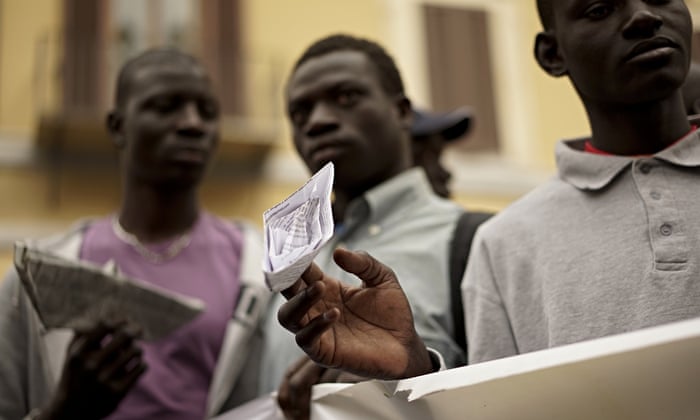Date: Sun, 26 Apr 2015 15:25:50 +0200
Guilt-tripping Europeans won’t help the drowning migrants
Partial or wholesale expulsions will be no more effective than gunships in stemming the exodus of young west African men attempting to reach Europe. Deterrence is not what is needed – at least, not against the migrants. And based on how development aid has been spent for the past 50 years in departure countries such as Gambia and Sierra Leone – or Mali, where I live – increasing it will not make much difference either.
Targeting the traffickers in Libya may temporarily reduce their activity in the Mediterranean. But, like ticket touts, they will be replaced. Even an effective clampdown, were it possible, would only move the problem down a bit. Algeria, Morocco and Tunisia are already dealing with explosive levels of youth unemployment.
The sub-Saharan migrants are determined. Before heading out to sea, they have already crossed the Sahara – a journey that may kill more travellers than the Mediterranean. West African migrants I have spoken to are not fleeing poverty. They are in revolt: against injustice, indignity, impunity and institutionalised corruption. Nor are they likely to be benefit scroungers – the humiliation of depending on others is precisely what they are leaving behind.
I have met young men on the move and men who have stayed behind and joined armed groups, some of them jihadist. Their stories are similar. For many in Mali, emigrating or joining an armed group – for a salary, sometimes just for a weapon – are fast becoming the only options. Zaparo, 26, is rebuilding the wall of a school in Gao, in the north-east of Mali. The 40-day contract pays $2 (£1.36) a day. Like thousands of young men in a country with no industrial base, his dream is to join the army. At his last recruitment day, he gained top marks in all the physical and written tests. “I knew my roll number and when they called it, another man’s name was next to it. He got on the bus instead of me. He was the son of a Somebody.’’ After that experience, Zaparo joined an armed group, which he has since escaped from.How long will he tolerate being a jobbing labourer on survival money?
I also met Theodis Windel Dennis, a Liberian, just before he boarded an open lorry for a six-day desert crossing to Algeria. Aged 26, he is a high-school graduate with a diploma in construction. He wants to “work for money’’ in Algeria or Morocco. For many migrants at this stage in the journey, Europe is not the objective; it is only when they discover there is no work in north Africa that they decide to cross. Dennis’s family raised $1,100 (£750) for him to travel.
Industrialise Africa? Encourage foreign investment? Yes, but … Mali is one of the poorest countries in the world, with illiteracy levels of up to 80% among girls, but also Africa’s third-largest gold producer. One foreign mining company tried to offer minimum monthly salaries of 70,000 CFA francs (£95), only to be told by the mines ministry that the entry wage should be no higher than for public sector workers: 45,000 CFA francs (£61). There are arguments for keeping lowly-paid nurses and teachers in their jobs, but you cannot live on £60 a month.
Corruption and nepotism are endemic. In hospitals, you buy your queuing ticket. Even if you study hard, you won’t get your baccalaureate on merit; it will cost up to $600 (£410). Traffic police use the highway code as a price list for bribes. Issa, a Malian who works for an international charity, told me about a mayor in the north of the country who wanted five boreholes in his village. He approached five donors and they all agreed. He had one borehole sunk and five plaques made.
The rot starts at the top. Six months after Ibrahim Boubacar Keita’s extravagant election campaign won him the presidency, the IMF discovered he had bought a $40m presidential jet, even though Mali already had one. Donors briefly suspended support, while the IMF set a must-do-better checklist. It was a rare show of authority. But President Keita is still jetsetting around the world.
His election in August 2013 was rubber-stamped by the EU because it needs to deal with “democratically elected’’ governments. This opens the aid channels – worth $900m (£615m) a year in Mali’s case. But scrutiny remains minimal. Diplomats admit they struggle to find ways for their aid to be well spent. At the same time, the international community seems driven by wanting to be seen as the biggest, most visible donor; the most prolific signer of blank cheques.
Malians are third on the list of those being plucked out of the seas around Sicily. Of course they are: Malians send home around $800m (£550m) per year – money that goes straight to the family, or to the village. But like aid, this money subsidises the Malian government as it continues to treat its people with contempt.
People in Europe must not turn a blind eye to the drownings in the Mediterranean, but nor should they be guilt-tripped by these sickening scenes. The same politicians who, in the name of the taxpayer, demand nit-picking levels of austerity at home are failing to challenge the corrupt leaders whose citizens are fleeing. Aid worsens corruption, and corruption in turn deters investment. Taxpayers should not tolerate this either.
